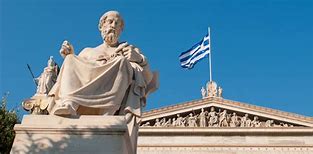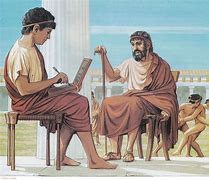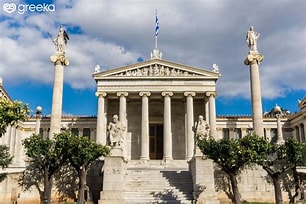The Ancient Greek Academies
Education has always been a cornerstone of civilization, shaping societies and individuals alike. When we look back at the roots of higher learning, the ancient Greek academies stand out as pivotal institutions that laid the groundwork for modern education. This article will explore the evolution of these academies, their founders, and their lasting impact on education and philosophy.
Introduction: A Journey Through Time
Imagine walking through the olive groves of ancient Athens, where philosophers debated profound questions under the shade of sacred trees. This was not just a scene from a history book but the vibrant reality of ancient Greek academies. These institutions were more than just schools; they were centers of thought, inquiry, and intellectual growth. From Plato’s Academy to Aristotle’s Lyceum, these academies revolutionized education and philosophy, influencing countless generations.

The Roots of Education in Ancient Greece
The Homeric Era: Foundations of Learning
The educational practices in ancient Greece can be traced back to the Homeric era (circa 8th century BC), where informal education began within families. Fathers imparted values and skills to their sons, emphasizing physical prowess and heroic ideals. Education was primarily aimed at preparing young men for citizenship and military service, reflecting the values of Greek society.
The Shift to Formal Education
By the 5th century BC, education began to evolve into a more structured system. Influenced by figures like Socrates and the Sophists, formal education became accessible to a broader segment of society. Schools emerged in urban centers like Athens, where students learned not only physical skills but also rhetoric, philosophy, and mathematics.
The Birth of Higher Learning: Plato’s Academy
Founding the Academy
In 387 BC, Plato established his Academy in a grove dedicated to Athena just outside Athens. This marked a significant shift in educational philosophy; it was the first institution dedicated to higher learning in the Western world. Plato envisioned a place where students could engage in philosophical discussions and explore complex ideas.
Curriculum and Teaching Methods
At the Academy, students studied various subjects including mathematics, astronomy, and ethics. Plato employed a dialectical method of teaching that encouraged critical thinking and debate. This approach not only fostered intellectual growth but also prepared students for active participation in civic life.

The Legacy of Plato’s Academy
Influence on Future Philosophers
Plato’s Academy became a model for future educational institutions. Notable figures such as Aristotle studied there before establishing his own school, the Lyceum. The Academy’s emphasis on inquiry and rational thought laid the groundwork for Western philosophy.
A Center for Scientific Research
Beyond philosophy, the Academy also contributed to scientific research. Scholars conducted studies in mathematics and natural sciences, setting the stage for future advancements in these fields.
Aristotle’s Lyceum: A Different Approach
Establishing the Lyceum
In 335 BC, Aristotle founded his Lyceum in Athens as a response to Plato’s teachings. While influenced by his mentor, Aristotle adopted a more empirical approach to education. He emphasized observation and practical experience as essential components of learning.
Curriculum Focused on Natural Sciences
The Lyceum offered a diverse curriculum that included biology, zoology, and ethics. Aristotle’s method involved collecting data from nature and drawing conclusions based on empirical evidence—a significant departure from Plato’s idealism.
The Role of Sophists in Ancient Education
Who Were the Sophists?
The Sophists were itinerant teachers who emerged around the same time as Socrates and Plato. They offered education for a fee and taught skills essential for success in public life, such as rhetoric and persuasion.
Democratizing Education
Sophists played a crucial role in making education more accessible to individuals beyond the elite class. Their teachings focused on practical knowledge that could be applied in everyday life, reflecting the changing values of Greek society.
Education Beyond Athens: Other Greek City-States
Sparta: A Militaristic Approach
While Athens embraced intellectual pursuits, Sparta focused on military training through its agoge system. Spartan education emphasized discipline and physical strength over intellectual development.
The Hellenistic Period: Expansion of Knowledge
During the Hellenistic period (323-30 BC), education spread throughout the Mediterranean due to Alexander the Great’s conquests. New schools emerged that blended Greek thought with local traditions, further enriching educational practices.

The Seven Liberal Arts: Codifying Knowledge
Trivium and Quadrivium
By late antiquity, education had evolved into a structured system known as the seven liberal arts: Trivium (Grammar, Rhetoric, Logic) and Quadrivium (Arithmetic, Geometry, Music, Astronomy). This framework became foundational for medieval universities.
Lasting Impact on Western Education
The principles established by ancient Greek academies continued to influence educational systems throughout Europe during the Renaissance and beyond. Their emphasis on critical thinking remains relevant today.
Conclusion: The Enduring Influence of Ancient Greek Academies
The ancient Greek academies were more than mere schools; they were crucibles of thought that shaped Western civilization. Their commitment to inquiry and knowledge laid the foundation for modern higher education systems worldwide. As we reflect on their legacy, we recognize that education is not just about acquiring knowledge but about fostering critical thinkers who can engage with complex ideas—an ideal that continues to resonate today.
FAQs About Ancient Greek Academies
1. What was the primary purpose of Plato’s Academy?
Plato’s Academy aimed to promote philosophical inquiry and develop critical thinking skills among its students through discussions on ethics, politics, and science.
2. How did Aristotle’s approach differ from Plato’s?
Aristotle focused on empirical observation and practical knowledge rather than abstract ideals; he emphasized studying nature directly through observation.
3. Who were the Sophists?
Sophists were traveling teachers who taught rhetoric and practical skills for public life; they made education more accessible to non-elite individuals in ancient Greece.
4. What subjects were taught at ancient Greek academies?
Subjects included philosophy, mathematics, astronomy, rhetoric, ethics, biology, and music—reflecting a comprehensive approach to education.
5. How did ancient Greek education influence modern systems?
The principles established by ancient Greek academies laid foundational concepts for liberal arts education and critical thinking skills that are integral to modern educational practices.


